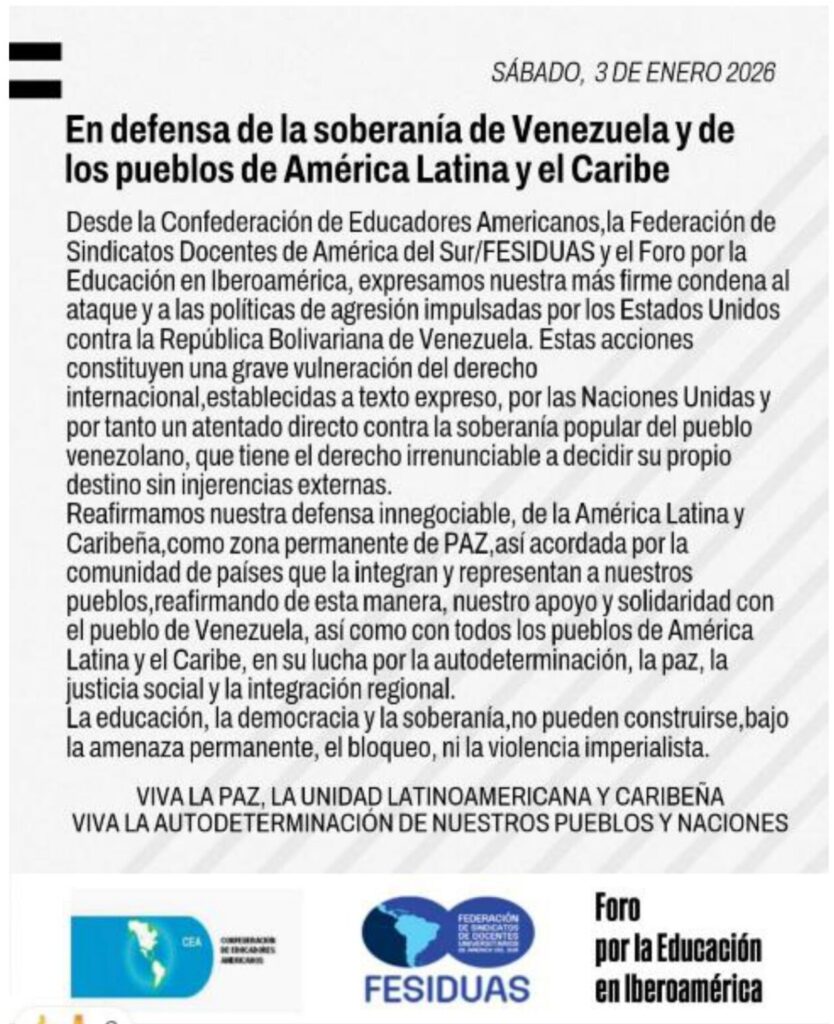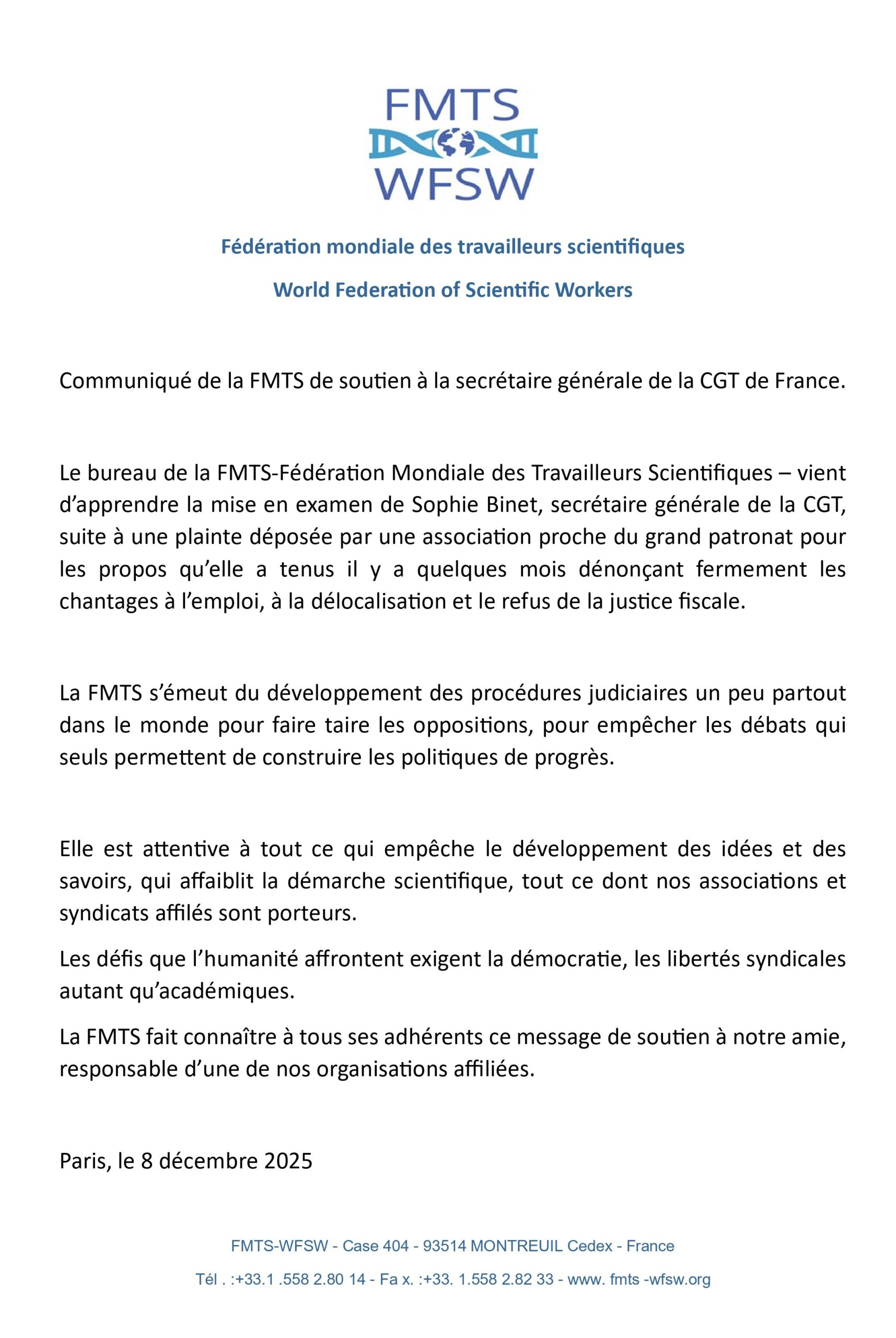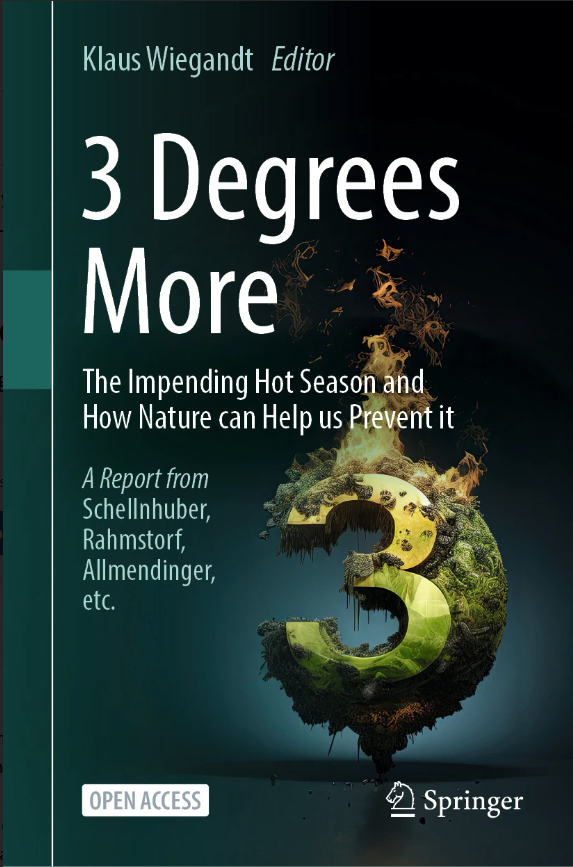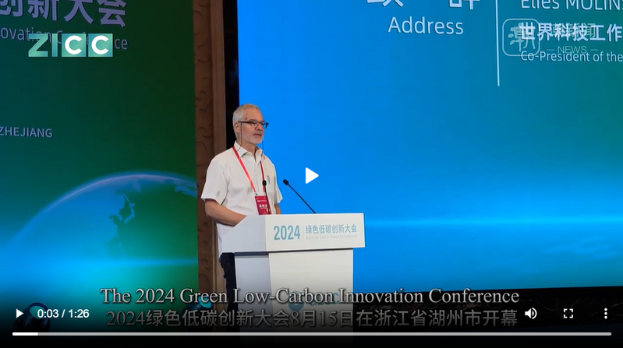About militarization of science
I shall focus on the struggle against the militarization of scientific research, i.e. against diverting it to an instrument of death and domination, whereas scientific research is an activity most essential to guarantee our present and future. I shall therefore seek to identify and describe the roots and context of this corruption of scientific research, and then suggest some paths for action.
I am speaking on behalf of the World Federation of Scientific Workers (WFSW), a network of associations, trade-unions and individuals. All of us are employees in the public or private sector, academics, engineers and technicians in basic and applied science and technology.
The WFSW has developed its activity in four directions over these last years.
First, ethics, responsibility of scientists (collective and individual); second,questions on environment, climate, access to water; third, condition of research and researchers underlining growing precariousness; andfourth, disarmament. This list is not given by order of importance. I have to make clear that on these subjects weare developinga partnership with UNESCO and under theUNESCO umbrella with different partners.
I give you these details in order to explain that our approach, for example on the question of peace and disarmament seeks to consider the whole context.
This comprehensive approach seems relevant to us at all stages: at the analytic stage it is important. For example, the new (neoliberal) funding policy for research, based on projects focused on so-called innovation, give less autonomy to the researcher and puts pressure on him to move toward projects related to arms development. another example at the global level: global warming and the difficulty of access to fresh water are certainly at the root of many conflicts. not to forget that injustice, despair, the absence of political, economic or social rights explain and can justify the violence of the victims.
In the activity stage it is even more important.
When I speak of the activity stage I mean the stage where our affiliates, our colleagues gather and struggle at their professional level or with a larger part of the population. It was a long time ago, but let us remember the “Stockholm appeal”, which was launched in 1950 and which was signed by millions of people from all over the world. This certainly prevented Truman, the US president, from using the nuclear weapon during the Korean war.
Another example: in 2003, huge protest marches were organized and gathered millions of people in many different countries on the same day (February 15). it was actually the first global protest in the history. The concrete result was the relative isolation of the US administration, and I do think that part of a generation learnt about and kept in mind America’s lies for example.
I shall now list the factors that contribute to militarization and particularly the militarization of science.
- driving forces for choice, management and funding (that I mentioned before) of research: the question of democracy
- huge public and private funds available for military research: some countries and companies devote huge sums and earn huge profits in the production and trade of weapons
- stagnation of peace studies, of history and epistemology of science in university curricula
- crisis in society, development of a certain fatalism, priority to material conditions: employment, salaries, housing, development of individualism, an example of which is the vote for far right parties
- weakening of collective defence of scientists, of the role of trade unions: too often, the only way to say “no” is to be a whistle blower.
- ignorance in the population of the building up of increasingly efficient lethal weapons.
This situation requires that we must improve education, information and democracy at all levels (international, national, work place).
This situation requires that we must seek broad coalitions to carry out strong actions, all types of struggles: with progressive political authorities (heads of state, supranational and international bodies), political parties, associations, NGOs and organizations at large which can ally with us.
Before I finish I would like to mention documents released by the WFSW (you can find them in www.fmts-wfsw.org) and read 3 short excerpts there from:
First, a paragraph of the statement concerning the situation in Ukraine that our Secretariat recently adopted:
” ” exactly 100 years ago, the world was plunged into a world war due to the greed of powerful interests that aimed at controlling an entire continent. At a time when the means of destruction were considerably less lethal then they are today, this First World War brought destruction to an unprecedented scale, killed and incapacitated millions of human beings. Today, for the survival of humanity, the opposing parties in a conflict will sooner or later have to engage bona fide in a peace process and in negotiations to find a compromise.
Second, I am quoting a resolution on military robots that we published 2 years ago:
” ” Robotics, both theoretical and applied is today a thriving field of Science and Engineering. As is the case with most areas of men’s endeavour, achievements in this field can be the source of unquestionable benefits but at the same time pose serious threats to people by jeopardizing human rights, living conditions and even lives. … Robots on and above the battlefield are bringing about the most profound transformation of warfare since the advent of the atom bomb.
” ” In recent years, the use of military robots has grown at an extraordinary rate. This trend raises new and serious ethical and legal issues. It can be argued that there is no longer a clear distinction between the “soldier” and a non-combating person, in particular those long distance “pilots” and desk table decision-maker civilian technicians that go home for dinner with their wives and kids at the end of a “work day”.
Third, I will be reading excerpts from an article we can find on our Website, a comprehensive survey on chemical weapons with international law, history, prospects in technology (written by a physicist from Portugal, Frederico Carvalho)
” ” The deliberate use of toxic chemicals to destroy human lives…has a long history and has taken many forms. Such chemicals were used as a means to carry out genocides or to eliminate specific groups of human beings as well as to fight armed dissident or terrorist groups…. It is estimated that during the First World War, some 1,250,000 people fell victims to toxic gases used by the warring powers, including 90,000 fatalities.
” ” Throughout the 20th century, some 70 toxic chemical compounds were produced and stored, often in large amounts.
” ” It would make sense to include in the 1993 Convention certain agents that are not deemed chemical weapons in this instrument, considering their effects and uses. In particular white phosphorus, depleted uranium and the infamous “agent orange” that was abundantly used by US forces in Vietnam as a defoliant. It was clearly a case of “ecocide” carried out in the country that was most intensely bombed in historyi. Depleted uranium was used by the US armed forces, namely in Iraq, and by NATO in Europe, in the Balkans.
” ” Moreover, it is of the utmost importance that these issues be debated within the scientific community…. It would also be desirable for these issues to be included in university curricula.
It is no coincidence that I’ll be finishing by this paragraph. To come back to action, to the ideas I’ve just listed, I repeat that, in order to develop the consciousness and the ability of scientists to be citizens in their labs, and the ability of citizens to impose a policy of research directed towards answering the needs of human beings rather than strengthening political and economic powers, we must promote:
-
conditions of autonomy, independence of scientists
-
more attractive science education,
-
curricula including history, epistemology, science and society
-
university for adults
-
democracy at all levels: but particularly at our level in the management of Research institutions(universities and institutes).
Beyond the question of peace-science and scientists, there is the question of peace and society. As long time as the international “disorder” will not guarantee to populations access to land, to fresh water, to clean air, to energy, to resources at large, as long as imperialism and selfishness of political and economic powers, helped by the dominant media seek to impose their law, we have to be pessimistic. It is only our commitment and our unity that can “get things moving”.
Lastly, I would like make three suggestions:
-
to keep in touch, we, organizations of scientists and/or persons concerned by the role of science and education for peace
-
to keep in touch with participants of this workshop
-
to draw the attention of our partners in social forums, so deeply involved in social and economic struggles that they could underestimate the problem of this still remaining arms race.




